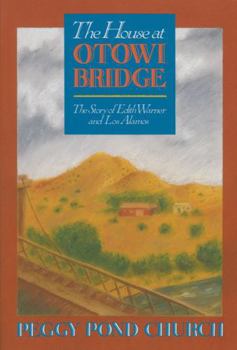The House at Otowi Bridge: The Story of Edith Warner and Los Alamos
(Part of the Zia Books Series)
Select Format
Select Condition 
Book Overview
This is the story of Edith Warner, who lived for more than twenty years as a neighbor to the Indians of San Ildefonso Pueblo, near Los Alamos, New Mexico. She was a remarkable woman, a friend to everyone who knew her, from her Indian companion Tilano, who was an elder of San Ildefonso, to Niels Bohr, Robert Oppenheimer, and the other atomic scientists who worked at Los Alamos during World War II. A finely told tale of a strange land and of...
Format:Paperback
Language:English
ISBN:0826302815
ISBN13:9780826302816
Release Date:May 1973
Publisher:University of New Mexico Press
Length:159 Pages
Weight:0.50 lbs.
Dimensions:0.5" x 5.3" x 7.9"
Customer Reviews
4 ratings
The House at Otowi Bridge: The Story of Edith Warner and Los Alamos
Published by Thriftbooks.com User , 15 years ago
The House at Otowi Bridge is a wonderful story of the impact that one woman can make on her time and place. The story is truly inspirational. I would like to have known Ms. Warner.
Lyrical and unsatisfying
Published by Thriftbooks.com User , 16 years ago
This is almost a prose poem about the beauties of the Los Alamos area and a life lived alone and apparently satisfyingly. Well, not entirely alone. Edith Warner, the subject of this biographical sketch, did live happily alone for a time -- how long a time? But then she was joined at the little house at Otowi Bridge by Tilano, a much older Indian man who was her companion until she died twenty-some years later. Edith was great friends with the Indians from the San Ildefonso pueblo, and with some of the scientists and support personnel at Los Alamos in the years when the bomb was being developed -- 1942 to 1945. It is this Los Alamos connection that has put her on the map, although her life was interesting enough in any case. But if you have at all a practical intellect, you will chafe at what isn't included in the book. Life in this remote spot presented numerous challenges -- how were they met? Edith soon after going to Otowi Bridge began serving teas -- that's how she met Robert Oppenheimer -- and later Oppie arranged that she should serve dinners to a couple of groups from "the Hill" each evening. But how did she get the food? Where did she store it? Did she have kitchen or garden help, beyond what Tilano provided? At some point a horse, a cow, and a dog appear in the narrative -- where did they come from? How much money might she have had and where did she keep it? She had a guest house too -- who did the laundry? Gasoline rationing during the war was mentioned as a problem, but for what would they have needed gas? Did she and Tilano have a car? Truck? Motorcycle? Where did she get the shirtwaist dresses she habitually wore? Most biographies fill in the blanks better than this. Edith is presented as a rather otherworldly person who worked very hard, and no doubt that view of her is true. But it is too magical; it can't be the whole story -- where is the rest?
The Heart of the Matter
Published by Thriftbooks.com User , 17 years ago
Notwithstanding the first reviewer's comments, as a former resident of Los Alamos, I find that Church's account comes far closer to the heart of the matter than does Frank Waters's treatment of the same subject, The Woman at Otowi Crossing.
The House at Otowi Bridge
Published by Thriftbooks.com User , 23 years ago
This last weekend I delighted in this book left behind by a guest at my B & B. It is without a doubt one of the most joyful and inspiring books that I have read in a long time. Beautifully told by Peggy Pond Church, it is the story of Edith Warner and her life near Los Alamos during the thirties and forties. How she created a simple home from nothing and how it became a mecca for her neighbors the world famous physicists of Los Alanos and also the local Indians. They came to her house for dinner, to take a respite from their secluded work at the Lab and in coming to enjoy her good food came to enjoy her friendship and serentiy. She live in close proximity to the Indians of San Ildefonso, and also became their friend, loving them, their children, watching them grow and enjoy with them their ceremonies and rituals. It is a poetic book of simple life and a good one and the great beauty of northern New Mexico. We need more Edith Warners in this world





